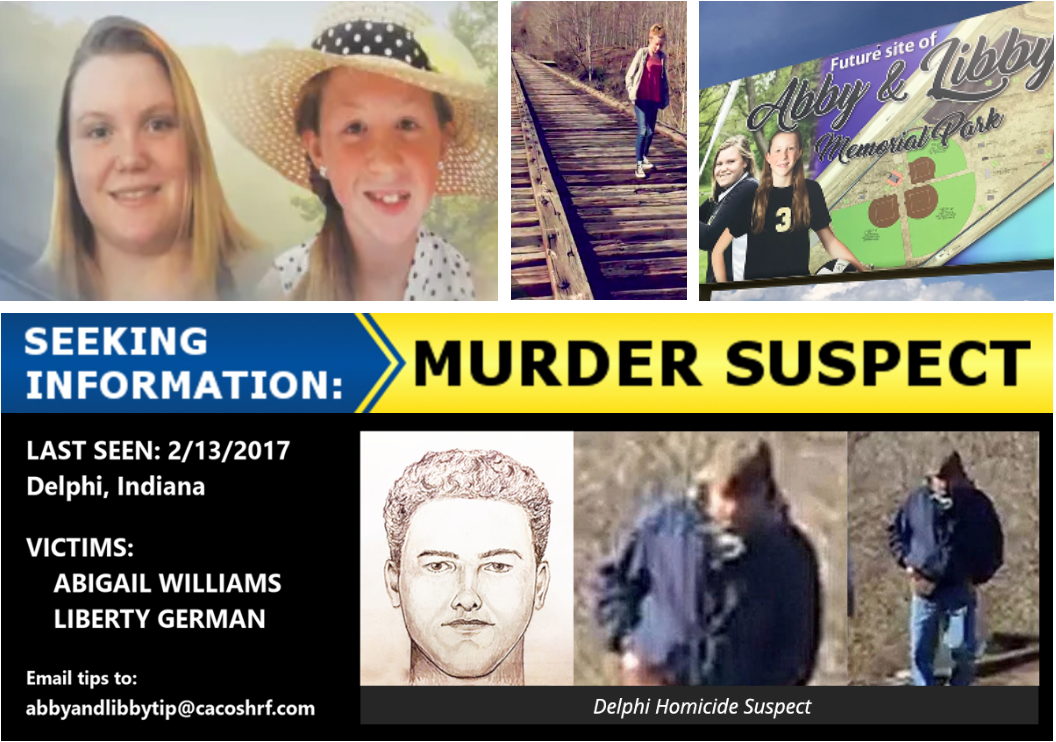In case you missed it, the recent doc Down The Hill: The Delphi Murders investigative documentary tracked the still unsolved murder case of Abby Williams and Libby German in Delphi, Indiana. We had the opportunity to talk with the HLN’s Barbara McDonald, host, and producer of Down the Hill: The Delphi Murders podcast, and the recent documentary.
Barbara MacDonald, who has dedicated so much time and energy to Abby and Libby’s case, and has worked hard to find justice, shared, “One of the biggest takeaways from my many trips to Delphi is that this is a crime that not only happened to these families – but to their community. I think Delphi was a far more trusting place before this happened. Mothers are more protective of daughters now, and strangers are looked at more suspiciously until they are known.”
“What happened to Abby and Libby should not have happened. They were simply out for some fresh air in the middle of the afternoon. It is my hope that by shining a light on this case through the podcast and documentary that we can help to move this case forward toward resolution,” said Barbara MacDonald.
February 13, 2021 marked the fourth anniversary of the brutal murders of Abigail Williams and Liberty German, followed the next day by the premiere of HLN’s Down The Hill: The Delphi Murders, a two-night special investigative documentary based on their hit podcast with over 10 million downloads since its release last year. Below are some of our biggest takeaways from the premiere of Down the Hill: The Delphi Murders.

Exclusive Interviews
Our first takeaway from watching the investigative documentary was the amount of never-before-seen or heard interviews from those both involved in the case, and those who lived in Delphi, Indiana at the time. Interviews from those directly involved in the case include Carroll County Sheriff, Tobe Leazenby, former Delphi Fire Chief Darrell Sterrett, Prosecutor Nicholas McLeland, and Retired Indiana State Police spokesman Kim Riley.
Family members interviewed included: Mike and Becky Patty (Libby’s custodial grandparents), Kelsi German (Libby’s older sister), Carrie Timmons (Libby’s mother), and Mercede Moudy (Libby’s cousin). Anna Williams (Abby’s mother) and Eric and Diane Erskin (Abby’s grandparents) were also interviewed.
Some of the notable interviews in the documentary were from those individuals who were not directly involved in the case but were living and working in Delphi in 2017. Julia Leahy, the President of the Carroll County Chamber of Commerce as well as Jennaca Combs, a resident of Delphi, offered a clear idea of what Delphi was like before Abby and Libby’s untimely deaths; a small, safe, and trusting community.
The Crime Scene
-
Signatures: A new piece of information we learned about the crime scene included the fact that several signatures were found. A signature refers to the specific behaviors that help to serve the criminal’s psychological and emotional needs. Physical evidence aids in establishing the signature behaviors of the criminal who perpetrated the specific crime. Some examples of a criminal’s signature behavior might be the level of injury to their victim, from minimal to excessive, the specific location that the crime took place, the victim’s age, race, or physical characteristics, or anything that was left at or taken from the crime scene. Any signatures left at a crime scene where there is a suspect not yet in custody can be used to create a profile of the individual who committed the crime. Further information regarding this profile and the signatures have not been released by police.
-
Forensics at the Crime Scene: Crime scene investigators spent four days at the crime scene collecting evidence. This does not necessarily mean that there was a lot of physical evidence left at the scene, it could also mean that it took crime scene investigators an extended period of time to comb through every inch of the area because of the outdoor location. Because the location where they found the girls was a wooded area, investigators would have to practically turn over every leaf within the limits of what they considered to be the crime scene. The area that they considered to be the crime scene could be larger than you might think. For example, hypothetically, if there was a piece of trash, maybe a half-empty water bottle or a candy wrapper, located five feet away from the immediate crime scene, the investigators might consider it a piece of evidence in case it belonged to the suspect, thus extending the size of the “crime scene”.
-
Fingerprints: Another piece of information that was mentioned in the documentary was that investigators recovered partial fingerprints from the crime scene. Sheriff Leazenby did not explain where the fingerprints were found, but he did make it clear that they do not know if the fingerprints belong to the suspect or not.
So many people have been affected greatly by the horrific deaths of Abby and Libby, specifically their families and friends. If you have any information regarding the murder of Abigail Williams and Liberty German on February 13, 2017, please do not hesitate to call: the anonymous tip line at (844) 459-5786, the Indiana State Police at (800) 382-7573, or the Carroll County Sheriff at (765) 564-2413. If you have anything you would like to send to investigators, including any pictures or videos, please email them to abbyandlibby@cacoshrf.com. Please do not send tips to any family members via their social media, send them straight to any of those tip lines or the email above.
Here’s How You Can Help
Share Abby and Libby’s story on any social media site, using #AbbyandLibby. You can find free downloadable posters to share on the family’s website and if you would like to and are able, you can donate to the Abby and Libby Memorial Park. Our team has visualized Abby and Libby’s case your insights could help uncover answers.
